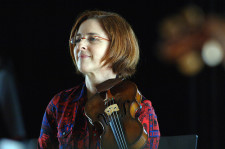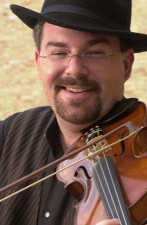Mark Rubin: a Little Song, a Little Dance, a Little Seltzer Down Yer Pants
An interview with Centrum’s Ruby Fitch
Longtime Austin resident Mark Rubin will be teaching and performing at this year’s Festival of American Fiddle Tunes. Mark is a multi-instrumentalist who is best known for manfully holding down the low end. Be it Klezmer or Polish dance music or whatever, Mark seems to relish all music made by honest-to-goodness folks. He was recently named the Director of the Folk Alliance International’s Music Camp, which will run concurrently with the annual Folk Alliance conference in Kansas City, Missouri. We gave Mark a handful of prompts, and he delivered these responses, which are just lousy with insight and character.
You are returning to Fiddle Tunes this summer, excellent! You, Cookie Segelstein, and Josh Horowitz are coming to the Festival as a nice Klezmer bundle; tell me about your musical history with these two.
We three met at a place not too unlike Fiddle Tunes actually. Cookie and Josh were faculty at Living Traditions’ annual Klezkamp, the original and oft-copied Yiddish culture incubator, when I first attended as a student in 1993. Founder Henry Sapoznik had been a fan of my American music project with Danny Barnes called the Bad Livers, and I was amazed that the same cat who I knew as a pioneering banjo player and pedagogue was also pivotally involved in the reclamation of Yiddish culture, one of many reconnections to culture that basked in the wake of the great “Folk Scare.” For several years Hank would nudge me to come and attend, and when I finally did, he hauled up me up onto the dance band stage and I haven’t left since.
As often occurs at these sorts of time and circumstance-limited magical environments, sensitive people tend to create very deep bonds of not only friendship and mutual musical admiration. But in Josh and Cookie’s case it was true love. We really really LOVE each other’s version of what Jewish music sounds like and on the very rare occasion we get to perform together, it’s the closest to a “haymische” as I get as a Jewish person.
Fiddle Tunes folks are in for a treat because we’ve only ever performed at Klezkamp, London Klezfest and the International Festival of the Accordion in San Antonio. This will be our 4th gig!
Fellow Texan Brian Marshall will also be teaching and performing at Fiddle Tunes this year. You and he were here in 2002, playing Texas-Polish tunes. Brian maintains a steady focus on Polish fiddle music in the state of Texas. When did you meet Brian? How has your musical relationship evolved?
I’m very glad you asked because it’s a good story and it allows me to pay credit to where credit is due. In the late 1980s-early 90′s there were very few people that you would run into at the punk clubs and the honkytonks in Dallas, Austin or Houston–and a few of those guys you would run into at the polka festivals, as unlikely as it might sound. The guy I noticed at all the coolest places from the Cannibal Club to Lerma’s to the St. Stanislaus Bazaar was Public Radio DJ/Union organizer Frank Motley. Frank travelled in every cool music community and prided himself on making connections and hipping people to great culture. One day he called me up and invited me to a Sunday afternoon party at his house near Hobby Airport. It was one of those special events that music writers wax poetic about because it lead to an amazing cross pollination of kindred musical spirits and and continues to this day.
Among many other amazing individuals, I met Czech accordionist Mark Halata and Polish fiddler Brian Marshall, who didn’t really know each other before. Not much too later, we were all in Brian’s Tex-Slavic Playboys and released a CD on Arhoolie. (And just a few years later, Mark decided that he was having too much fun with the Texas Poles and with myself on tuba this time formed Texavia, currently the reigning champion of battle dances all across his native Texas Moravian and Bohemian communities.)
Brian comes directly out of a living, breathing and ever-evolving culture, and not many folks today can say the same. For years, Brian thought that only his community would be interested in his music, simply because in his culture music is simply functionary; folks get together, they eat and drink and dance, somebody has to play and most folks do (a little at least.). Playing the fiddle to Brian is no different to him than making Kapusta, dancing with his wife or celebrating mass; it just a byproduct of being a Texas Pole.
On the many occasions I would try to get him to relent and play a festival someplace outside of his four-county range of Houston, he was resolute: “Why on Earth,” he would ask “would anybody who didn’t have to born into it be interested in this stuff?”Even with all indications to the opposite, he still professes no interest in a “revival” in Texas Polish Culture. Rather he has simply lived Texas Polish Culture, which in his fashion looks like so much fun nobody wants to get left out, which is in fact the only reason he ever picked up a fiddle in the first place. It’s been a one of the most humbling honors of my life to have been introduced so warmly into this community. And it has be very gratifying to see the younger kids, not just Marshall’s but Kazowskis’ and Mazurkiewicz’s as well, not only picking up the music and language but the customs and traditions that inform them. So they can be cool too.
You are a bass player and have noted that back in the day, neither Jews nor Poles could afford basses, so they used cellos. Elaborate…
Yeah. I’ve been teaching bass instruments at KlezKamp for many years now and I start my class with: “Welcome to Yiddish bass. First lesson: there is no Yiddish bass.” Once we get over that hump, there is still quite a lot to study. The real truth is that living folk traditions are fluid and impossible to pin down too well. And further, the word “bass” means a wide variety of stringed instruments from a small cello with 3 strings to a mammoth contrabass with 5 strings, all in the last century, and a modern player can pick and choose what suits them as Yiddish music is, for all intents, locked in amber and not reflective of a shared community aesthetic any longer.
History informs the music as well, given that the Jews of Europe from the 16th century until the Russian Revolution were restricted by very particular laws concerning what instruments they could and could not play, (and I’ve never seen a bass-like instrument on that list.) And real economics were such that very few musicians could afford their own instruments, which often times were owned by a nobleman and simply made available to the band only when they had a gig. Jewish participation in the Tsarist wars of empire, where the smart conscript finds his way into the brass band far behind the lines, gradually changed the instrumentation of the traditional simcha groups, adding the ‘loud’ brass and reed instruments and introducing the low brass into the tradition.
Older musicians I have interviewed noted that bassists and drummers usually did not travel far and were paid less than the fiddlers and flautists but with no less esteem. Some bassists doubled on several instruments, much as many do today as well! Rather than get too focused on the mechanics of a particular instrument per se, it’s the tradition of Yiddish music to concentrate on the musical role to be provided and that’s a hard concept for most Western trained players to grok.
As for Texas Polonia, I’ve been told by everyone I ever met that the ‘mialy bas” or small bass is the emblematic choice for bass in this immigrant community. Played rudimentarily and always with a strong down bow, there are photos of cellos and basses of every size being used at Texas Polish weddings, some even played horizontally with a strap much like the Gorale Highlander musicians of southern Poland and many parts of rural Eastern Europe. Usually 3 strings, they can be tuned however you like and personally I switch between 4ths (low A) and 5ths tunings (low C.) But in practice, any bowed bass will work. The sound is essential to the region and the old men will not let you slack off and start plucking. No sir.
You have a very healthy interest in recorded music, roots and paths of music and human history, and tunes. What are you digging and digging into right now?
Emblematic culture. Stuff that happens in a time and a place that doesn’t happen like that anywhere else. It has been the frighteningly swift end of emblematic culture that has defined my life as a musician. In my study of styles and approaches to music, I found culture and the context and function where the music lives. For me at least, once you view music and dance as simply by-products of a total culture, you really just can’t look at it any way else. The language, faith, visual aesthetic are as important to the music and devoid of that context, it’s just not music.
As I divine the particular differences of cultures and traditions, rather than focus on what makes them different, I’ve used the process to look at what empty space resides between peoples, and by training your sight to see the void around the shape, you can, I hope, come to the place that represents where all mankind is in fact the same people. Others may take a more post-modernist approach in this study but I was raised in a different way and I just don’t know any other way to problem solve when it comes to culture.
As an enthusiastic booster for the native cultures of Texas I can report it’s been really tough watching folk traditions wither and fold up in the face of consumerism and cultural assimilation, especially in the Tejano and Czech-Bohemian communities. But on the other hand, there’s plenty to be hopeful about having watched Brian Marshall’s community finally start supporting his efforts and now extending into a new generation (and not just kids with the last name Marshall!). Any sensitive person viewing French speaking Louisiana has seen what can be done when language and culture are re-appreciated.
A similar emergence seems to be bubbling up, proto-culture like, of young people embracing Yiddish culture and re-acquainting themselves to a narrative of Jewish life and culture that isn’t defined be unfortunate Middle East politics and troubling fundamentalism. Young Jews, and a fair amount of non-Jews as well, are rediscovering the deep strains of social and economic justice and a tradition of Union rabble rousing that the Yiddish language has been historically enter twined. Dynamic times, to be sure.
Please talk a little bit about what you’ll be bringing to the classroom this summer
A little song, a little dance, a little seltzer down yer pants. I’ll be bringing a positive attitude and look forward to sharing the silly little things I keep up in my brain.
This interview originally appeared on Centrum’s Festival of American Fiddle Tunes website. Mark Rubin is on staff at Fiddle Tunes (June 30-July 7) this summer. Centrum, in Port Townsend, Washington, is celebrating 40 years of programming this year.
http://centrum.org/2013/02/mark-rubin-a-little-song-a-little-dance-a-little-seltzer-down-yer-pants/
(Photos: middle: Cookie Segelstein, bottom: Brian Marshall)




